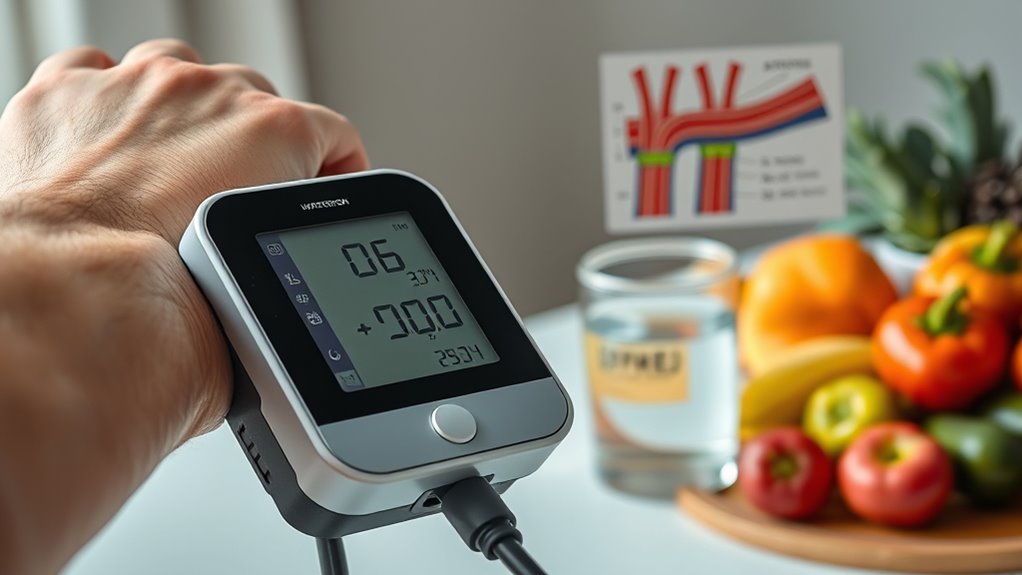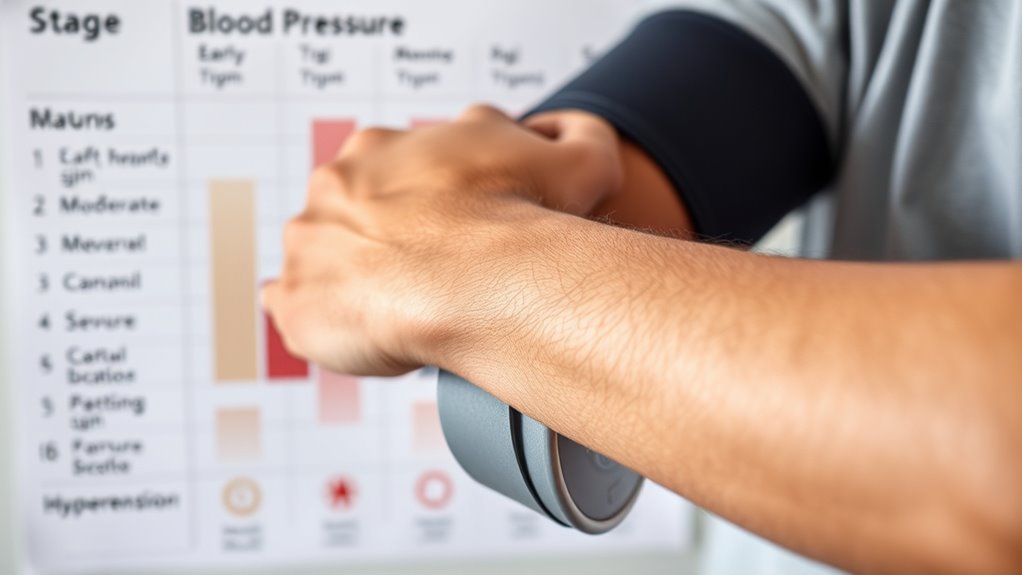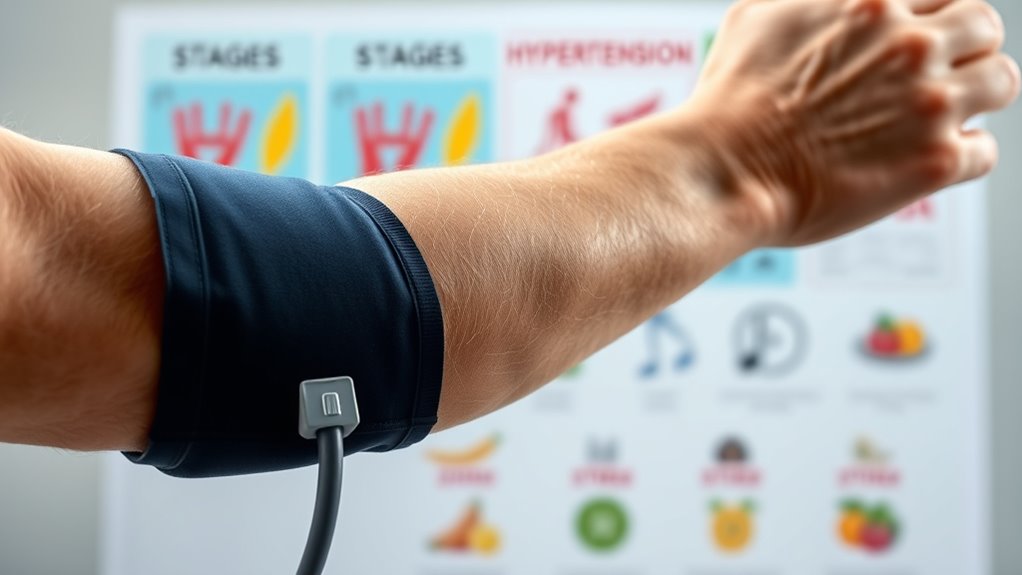Hypertension, or high blood pressure, stems from genetic, dietary, and lifestyle factors that gradually damage your blood vessels. It often starts with subtle signs like headaches and dizziness, progressing slowly to severe stages if unchecked. Managing it involves reducing salt intake, staying active, managing stress, and avoiding smoking and excess alcohol. Understanding these causes, stages, and lifestyle tips can help you take control; exploring further will give you even more practical ways to protect your health.
Key Takeaways
- Hypertension is caused by genetic, dietary, and lifestyle factors that affect blood vessel elasticity and hormone regulation.
- It develops gradually, with early signs like headaches, progressing to vessel damage and organ complications if untreated.
- Managing hypertension involves lifestyle changes such as reducing salt intake, exercising, stress reduction, and medication adherence.
- Proper monitoring and awareness of its stages help tailor treatment and prevent severe health risks like heart attack or stroke.
- Prevention focuses on healthy habits, balanced diet, stress management, and regular check-ups to maintain optimal blood pressure levels.
Understanding the Root Causes of High Blood Pressure

High blood pressure often results from a combination of factors that affect your body’s ability to regulate blood flow. Genetic factors play a significant role; if hypertension runs in your family, you’re more likely to develop it. Your genes can influence how your body manages salt, blood vessel elasticity, and hormone production, all of which impact blood pressure. Dietary influences also contribute heavily. Consuming too much salt, saturated fats, and processed foods can cause your blood pressure to rise over time. Conversely, a diet lacking in fruits, vegetables, and whole grains may weaken your cardiovascular health. These factors work together, making it essential to understand your family history and adopt a balanced diet to help prevent or manage high blood pressure effectively. Additionally, automation in healthcare is increasingly used to monitor blood pressure and manage treatment plans more effectively. Recognizing lifestyle factors such as physical activity levels and stress management can further improve blood pressure control.
The Progression of Hypertension: From Early Signs to Severe Stages

Hypertension often develops gradually, starting with subtle changes that may go unnoticed. As blood pressure rises, your blood vessels endure damage, leading to stiffening and narrowing. Without intervention, this damage worsens, causing more severe stages. Early signs might include headaches or dizziness, but many remain unaware until complications occur. Consistent medication adherence is vital to slow progression and protect blood vessels. Additionally, understanding the stages of hypertension can help tailor effective treatment strategies. Recognizing the importance of vascular health can further aid in managing the condition effectively. Over time, high blood pressure can cause organ damage, increasing risks for heart attack or stroke. Recognizing the progression helps you understand the importance of monitoring and managing your blood pressure. Maintaining a healthy lifestyle, including regular exercise and a balanced diet, can also play a crucial role in preventing further damage. Developing a comprehensive understanding of hypertension management can empower individuals to take proactive steps toward better health.
Practical Lifestyle Strategies to Manage and Prevent Hypertension

Managing blood pressure effectively requires more than just medication; lifestyle changes play a pivotal role in preventing further damage to your blood vessels. Start with dietary adjustments by reducing salt intake, eating more fruits and vegetables, and limiting processed foods. These changes help lower your blood pressure naturally. Additionally, stress management is critical—practice relaxation techniques like deep breathing, meditation, or yoga to keep stress levels in check. Regular physical activity also supports healthy blood pressure, but it’s indispensable to choose activities you enjoy and stay consistent. Avoid smoking and limit alcohol consumption, as these can worsen hypertension. By combining dietary adjustments and stress management, you empower yourself to control your blood pressure and reduce your risk of complications.
Frequently Asked Questions
Can Hypertension Be Completely Cured With Lifestyle Changes Alone?
You might wonder if lifestyle modifications can completely cure hypertension. While making healthy changes like eating better, exercising, and reducing stress can markedly lower your blood pressure, they often don’t eliminate the need for medication. Some people become less dependent on medication through these changes, but others may still require it. So, lifestyle modification can help manage hypertension effectively, but it may not fully cure it, especially in advanced cases.
How Does Genetics Influence the Risk of Developing Hypertension?
Think of your genes as a map guiding your health journey. Your genetic predisposition and hereditary factors shape your risk of developing hypertension, like a blueprint that sets potential routes. While lifestyle choices influence the path, your genetics can make some routes easier or more challenging. You can’t change your blueprint, but understanding it helps you navigate better, reducing your risk and managing blood pressure effectively.
Are There Specific Foods That Can Naturally Lower Blood Pressure?
You can naturally lower your blood pressure through diet modifications and herbal remedies. Incorporate foods rich in potassium like bananas, spinach, and sweet potatoes, which help relax blood vessels. Limit salt intake to reduce fluid retention. Herbal remedies such as garlic, hibiscus tea, and hawthorn may also support healthier blood pressure levels. Remember, combining these with a balanced diet and regular exercise can make a significant difference.
What Are the Long-Term Health Risks Associated With Untreated Hypertension?
If you leave hypertension untreated, you risk serious long-term health issues. High blood pressure can cause vascular damage, weakening your arteries and increasing the chance of strokes or heart attacks. Over time, it may lead to organ failure, affecting your kidneys, eyes, and brain. Ignoring these risks can greatly reduce your quality of life, so managing blood pressure is essential for preventing these potentially life-threatening complications.
How Does Stress Impact Blood Pressure Levels Over Time?
Stress can markedly impact your blood pressure over time by triggering hormonal responses like increased adrenaline and cortisol. These hormones cause your blood vessels to narrow and your heart to beat faster, raising your blood pressure. Without proper stress management, this cycle continues, potentially leading to sustained hypertension. To protect your health, focus on stress management techniques such as exercise, meditation, and deep breathing, which help regulate hormonal responses and maintain healthy blood pressure levels.
Conclusion
By understanding what causes hypertension and recognizing its stages, you can take control of your health. For example, imagine someone who starts exercising regularly and eating healthier after early warning signs—these small changes can prevent the condition from worsening. Remember, lifestyle interventions like balanced diet and physical activity make a real difference. Stay proactive, monitor your blood pressure, and don’t wait until it’s too late—your heart health depends on it.









